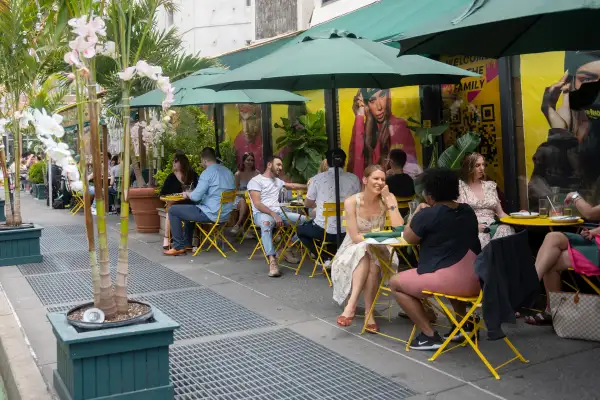Americans Say They're Spending an Extra $700 a Month This Summer

People are spending way more money this summer compared to a year ago.
The average person who says the reopening economy has affected their habits is dishing out $765 more per month than they were at this time last year, according to a new survey conducted for MassMutual. That’s no small increase: It's only a couple hundred bucks less than the median full-time worker's weekly wage before taxes ($990).
Life insurance and financial service firm MassMutual surveyed 1,000 adults in July, and nearly half said they are being driven to spend more this summer because of what they see on social media. FOMO, or the fear of missing out, has led millennials and Gen Z in particular to attend more gatherings and increase their spending. Both of those age groups reported that their spending was influenced to rise by more than $1,000 per month compared to last summer, the survey indicated.
Of the Gen Z-ers surveyed, MassMutual found nearly all of them — 90% — felt social media led them to spend more this summer.
Unsurprisingly, dining out and traveling are the biggest outlets for Americans’ increased spending. More than a third of those surveyed say they spent more on those categories, after largely avoiding them last summer. Other data supports what people are saying in surveys, with restaurant sales rising nearly 2% last month. The number of travelers at U.S. airports is triple what it was a year ago.
Meanwhile, prices for vacation rentals are going up as more people travel, and hotel prices hit an all-time high last month. Airbnb says sales are way up from the same time last year, suggesting that travelers are feeling optimistic and continuing to plan future trips.
But not all investors are confident the trend will continue, so much so that Airbnb’s stock price dropped after its earnings call earlier this month. What's more, credit card companies like Chase and Bank of America have noticed dips in flight bookings in recent weeks, in a sign that the rise of the Delta variant could be discouraging some Americans from future travel.
Overall, though, as people spend more, their saving habits are flagging. The pandemic turned America into a nation of savers, but the trend seems to be reversing lately. Nearly half (48%) of those surveyed say they saved less than $500 over the past three months, compared to 36% who reported doing so in a similar MassMutual poll in April.
Consumer purchasing trends seem to be in flux, however. Spending on goods — such as clothes, online purchases and furniture — actually went down in July. Car sales dipped by nearly 4%, partly due to shortages and high prices. That's a big change from even last month, when shoppers were still spending big on online purchases and electronics.
Throughout much of the pandemic, stimulus checks spurred consumer spending on items they could use while stuck at home. Now, their calculations have changed. More recently, fewer customers are visiting stores like Home Depot, whereas earlier in the pandemic they were going on buying sprees for home renovation projects.
It’s likely the shift away from buying goods and towards spending on services like restaurants and travel will continue, experts say.
More from Money:
Best Travel Rewards Cards of August 2021
9 Best Travel Insurance Companies of 2021
Tennis Balls, Pickles and 5 Other Surprising Shortages Right Now

